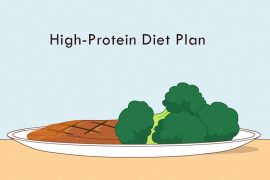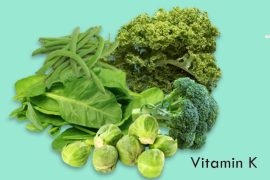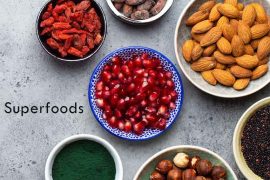Incorporating biotin into your daily diet helps your body to convert food into energy. Also called vitamin H or vitamin B7, biotin rich foods are important for eye, hair, skin, and brain function, including supporting liver functions. Biotin is a water-soluble vitamin, which means that your body doesn’t store it, as a result, you need to consume it regularly to maintain adequate levels.
What is Biotin
Biotin, is an important component of enzymes that break down substances in your body like fats, carbohydrates, and amino acids. Biotin is also called vitamin B7 or vitamin H. Low amounts of biotin are found in various foods. Biotin is also found in supplement form, which is typically used to treat hepatitis, brittle nails, neuropathy (damage or dysfunction of one or more nerves), and other conditions. Biotin deficiency is so rare that there isn’t enough evidence to establish a recommended daily allowance or estimated average requirement for it. However, experts have suggested the daily value for biotin is typically around 30 mcg per day. While biotin is available as a supplement, most people can also replenish their biotin needs with a vegan diet as well.
Need for Biotin as a Dietary Intake
Your body uses biotin to regulate your genes and help your cells communicate. The amount of biotin you need depends on your age. The daily recommended intake of biotin is 30 micrograms or mcg for adults who are 19 years old and above. Women who are lactating should consume 35 mcg per day. There is some evidence to suggest that biotin supports the health of your hair, nerves, and digestive tract; however, future studies are on their way to confirming its uses.
Top 10 Biotin-Rich Foods For Your Daily Diet
1.) Egg Yolks
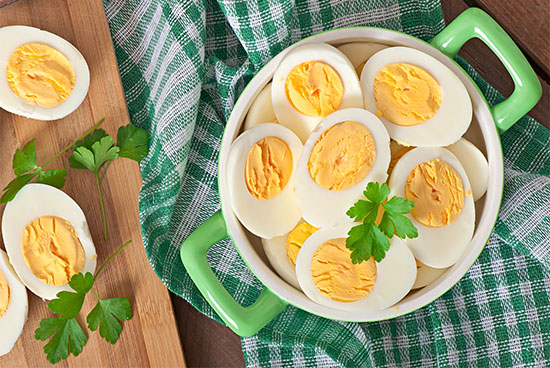 Eggs are full of biotin, protein, iron, and phosphorus. The yolk is treated as one of the biotin rich foods. Cooked egg provides approximately 10 mcg of biotin or approximately 33% of the DV. You should always cook eggs fully, both to reduce your risk of salmonella poisoning and improve biotin absorption. Egg whites contain a protein called avidin, which can interfere with biotin absorption if eaten raw.
Eggs are full of biotin, protein, iron, and phosphorus. The yolk is treated as one of the biotin rich foods. Cooked egg provides approximately 10 mcg of biotin or approximately 33% of the DV. You should always cook eggs fully, both to reduce your risk of salmonella poisoning and improve biotin absorption. Egg whites contain a protein called avidin, which can interfere with biotin absorption if eaten raw.
2.) Legumes
 Legumes as one of the biotin rich foods are a great source of biotin, with the two richest sources being peanuts and soybeans. Serving of roasted peanuts has just under 5 micrograms of biotin, or 17 per cent of the DV. A 3/4-cup or 100-gram serving of whole soybeans has 19.3 micrograms of biotin, which is 64 per cent of the DV. Other legume sources include peas, beans, and lentils, which are also full of protein, fibre, and micronutrients.
Legumes as one of the biotin rich foods are a great source of biotin, with the two richest sources being peanuts and soybeans. Serving of roasted peanuts has just under 5 micrograms of biotin, or 17 per cent of the DV. A 3/4-cup or 100-gram serving of whole soybeans has 19.3 micrograms of biotin, which is 64 per cent of the DV. Other legume sources include peas, beans, and lentils, which are also full of protein, fibre, and micronutrients.
3.) Seeds and Nuts
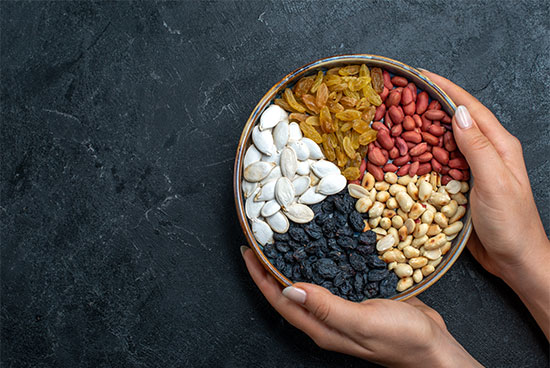 Seeds and nuts are also one of biotin rich foods, especially sunflower seeds and almonds. A 1/4-cup (20-gram) serving of roasted sunflower seeds has 2.6 micrograms of biotin or 10 per cent of the DV. A 1/4-cup (30 grams) of roasted almonds contains 1.5 micrograms or 5 per cent of the DV. Nuts and seeds are also excellent sources of fibre, unsaturated fat, and protein.
Seeds and nuts are also one of biotin rich foods, especially sunflower seeds and almonds. A 1/4-cup (20-gram) serving of roasted sunflower seeds has 2.6 micrograms of biotin or 10 per cent of the DV. A 1/4-cup (30 grams) of roasted almonds contains 1.5 micrograms or 5 per cent of the DV. Nuts and seeds are also excellent sources of fibre, unsaturated fat, and protein.
4.) Liver
 Organ meat such as liver is also one of the biotin rich foods. The liver contains a large amount of high-quality protein, including other important nutrients such as B vitamins and folate. Protein builds muscle mass and is important for cell function too. B vitamins sustain your energy levels while folate improves heart health.
Organ meat such as liver is also one of the biotin rich foods. The liver contains a large amount of high-quality protein, including other important nutrients such as B vitamins and folate. Protein builds muscle mass and is important for cell function too. B vitamins sustain your energy levels while folate improves heart health.
5.) Sweet Potato
 Sweet potato is also one of the biotin rich foods, as half a cup of cooked sweet potato contains 2.4 micrograms of biotin Apart from biotin, sweet potatoes are also rich in beta-carotene a powerful antioxidant that enhances your skin’s appearance. Beta-carotene and other carotenoids found in sweet potatoes are also known to be important for healthy vision and prevent related diseases like macular degeneration.
Sweet potato is also one of the biotin rich foods, as half a cup of cooked sweet potato contains 2.4 micrograms of biotin Apart from biotin, sweet potatoes are also rich in beta-carotene a powerful antioxidant that enhances your skin’s appearance. Beta-carotene and other carotenoids found in sweet potatoes are also known to be important for healthy vision and prevent related diseases like macular degeneration.
6.) Almonds
 Almonds are also one of the biotin rich foods, as one-fourth cup of roasted almonds contains 1.5 micrograms of biotin. Almonds are also particularly rich in magnesium and vitamin E. They are also rich in fibre that promotes satiety and aids weight loss. Almonds are also considered a healthy food for the heart as it helps to reduce LDL cholesterol levels in our body, which is a known risk factor for coronary heart disease.
Almonds are also one of the biotin rich foods, as one-fourth cup of roasted almonds contains 1.5 micrograms of biotin. Almonds are also particularly rich in magnesium and vitamin E. They are also rich in fibre that promotes satiety and aids weight loss. Almonds are also considered a healthy food for the heart as it helps to reduce LDL cholesterol levels in our body, which is a known risk factor for coronary heart disease.
7.) Spinach
 Spinach is also one of the biotin rich foods, as half a cup of boiled spinach contains 0.5 micrograms of biotin. Spinach is rich in vitamins, minerals, fibre, and chlorophyll. And it is particularly rich in iron. The antioxidants in spinach help to keep you healthy, slow the ageing process, and protect against disease. As with all leafy green vegetables just make sure it’s organically grown to achieve the greatest health benefits.
Spinach is also one of the biotin rich foods, as half a cup of boiled spinach contains 0.5 micrograms of biotin. Spinach is rich in vitamins, minerals, fibre, and chlorophyll. And it is particularly rich in iron. The antioxidants in spinach help to keep you healthy, slow the ageing process, and protect against disease. As with all leafy green vegetables just make sure it’s organically grown to achieve the greatest health benefits.
8.) Broccoli
 Broccoli as one of the biotin rich foods is often dubbed a superfood for the simple reason that it is loaded with nutrients. It is rich in vitamin K which promotes bone and skin health. And the vitamin C and antioxidants this mini tree contains help prevent various forms of cancer. Besides all, Broccoli is one which is widely considered one of the vegan sources of calcium. As a vegan-based antioxidant food, Broccoli is fuelled with all the necessary antioxidants like carotenoids lutein, zeaxanthin and beta-carotene. These antioxidants mentioned above play a pivotal role in fighting cancer and also boost immunity.
Broccoli as one of the biotin rich foods is often dubbed a superfood for the simple reason that it is loaded with nutrients. It is rich in vitamin K which promotes bone and skin health. And the vitamin C and antioxidants this mini tree contains help prevent various forms of cancer. Besides all, Broccoli is one which is widely considered one of the vegan sources of calcium. As a vegan-based antioxidant food, Broccoli is fuelled with all the necessary antioxidants like carotenoids lutein, zeaxanthin and beta-carotene. These antioxidants mentioned above play a pivotal role in fighting cancer and also boost immunity.
9.) Mushrooms
 Mushrooms being considered one of the biotin rich foods have a high biotin content, which actually protects them from parasites and predators in the wild. About 20 caps (120 grams) of canned button mushrooms have 2.6 micrograms of biotin, which is nearly 10 per cent of the DV. A 1-cup (70-gram) serving of chopped, fresh button mushrooms have even more: 5.6 micrograms. These nutrient-rich fungi have so many other health benefits on top of that. They’re a great source of selenium, magnesium, and antioxidants.
Mushrooms being considered one of the biotin rich foods have a high biotin content, which actually protects them from parasites and predators in the wild. About 20 caps (120 grams) of canned button mushrooms have 2.6 micrograms of biotin, which is nearly 10 per cent of the DV. A 1-cup (70-gram) serving of chopped, fresh button mushrooms have even more: 5.6 micrograms. These nutrient-rich fungi have so many other health benefits on top of that. They’re a great source of selenium, magnesium, and antioxidants.
10.) Bananas
 Bananas are also one of biotin-rich foods. One small banana (105 grams) provides about 0.2 micrograms of biotin or 1 per cent of the DV. Bananas are also full of fibre, carbs, and micronutrients like B vitamins, copper, and potassium, so there are plenty of other benefits to consider.
Bananas are also one of biotin-rich foods. One small banana (105 grams) provides about 0.2 micrograms of biotin or 1 per cent of the DV. Bananas are also full of fibre, carbs, and micronutrients like B vitamins, copper, and potassium, so there are plenty of other benefits to consider.
Disclaimer:
The information contained in this article is for educational and informational purposes only and is not intended as a health advice. We would ask you to consult a qualified professional or medical expert to gain additional knowledge before you choose to consume any product or perform any exercise.






